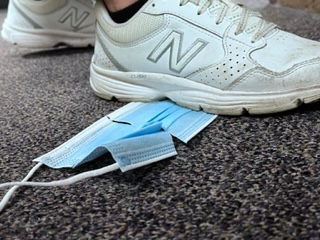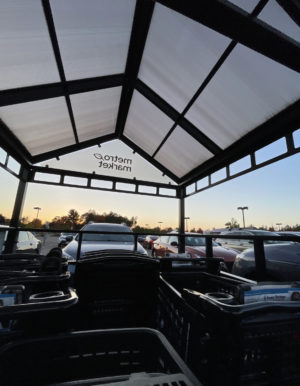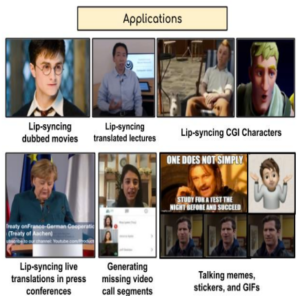Masks in 2022

October 20, 2022
You’re in 2020, the world is in a state of panic, there’s news reporting the number of deaths each week, each month. News Networks are describing how hospitals are so overwhelmed they can’t keep up with the excessive amount of patients. Chinese business owners and US citizens are receiving hate online telling them it’s their fault the corona virus is affecting the USA, and are receiving a plethora of verbal and physical racist attacks. Tiktoks are displaying the memories and memorials of loved ones. This was a time of fear and sorrow, something we couldn’t control.
We tried everything we could: distancing, awareness, and then came masks. They were flying off the shelves along with a range of other items that were in short supply. But for a few groups of people, they were skeptical. Why are we wearing masks? How do we know that these work? And it was echoed among this community that “masks are like trying to stop a mosquito from going through a barbed wire fence.” This has led to much controversy rooted in control, power, and politics. 2022 is an era when for the most part, we get to decide whether we want to wear a mask. But let’s take a dive into some of the reasons how the choice to wear masks is influenced, and how it affects us all. At this period of time, this article will be showcasing why wearing a mask should be a personal choice for the inhabitants of Portage County.
Why are People Wearing Masks?
From the four interviews conducted, a significant similarity occurred; the interviewees did in fact believe that politics affected the individuals choice in why they chose to wear a mask. As Mr. Reindl, a SPASH philosophy teacher, states, “ People aren’t making decisions based on their and their family’s health. And some people who aren’t wearing masks aren’t refusing so for health related reasons.” As we know, certain brackets of ages and those with medical conditions were the exception to mask policies in a multitude of facilities. However as Mr. Reindl had stated, some individuals didn’t refuse to wear masks because they had a medical condition or of old age, but because they simply did not want to sacrifice or sucom to the polices.
When Politics and Health Collide
This poses a serious issue, extending beyond the masks. If politics have an effect on decisions regarding health, then we are posing the question that our medical knowledge could be misguided, or politically influenced. And therefore, the basis of well being has room for error and corruption. Politics and health are two fields that have crossed over since the formation of hereditary monarchys, but today we can see these issues in cases such as abortion, the coronavirus itself, and matters of money in medical emergencies. This overlap has festered the news and populated cities into a battlefield. Issues of conflicts of rights, had crowds marching around Washington, Los Angeles, New York, and Chicago regarding Roe v. Wade and marching American civilization further into the ‘great political divide’.
Why Some Locals are Still Wearing a Mask
Diving further into the interviews, the question of why the interviewees do or do not choose to wear a mask was brought up. All but one of my interviewees did not wear a mask on a regular basis, but some of the answers they gave me were surprising. A friend of mine, Cindy Vue, has told me that she wears a mask not just because of health reasons, but because she felt more comfortable at school with her mask on, almost as a protective blanket. For most of the other interviewees, they stated that they didn’t feel like a mask was necessary at this time, when cases are so low. Plus they have already been vaccinated so the risk itself is even lower for transmission.
For my one exception in my on record interview, Katie Trzebiatowski is a daughter of a mother whom is autoimmune compromised. Katie has told me that it is important for her to wear a mask not only to protect her mother from the virus, but also to protect her mother from any other transmittable diseases that Katie may have picked up while out in her community. Katie understands that this is her personal choice and she is grateful that this is something she can do everyday to protect her family.
Local Regulations
As we dive into more local regulations, we can see that SPASH has a policy that requires any individual to wear a mask when back at school for the next 5 days, after testing positive for Covid-19. And as of Apr 18, 2022 masks are no longer required on public transportation. The CDC states universal health care facilities are no longer required to mask in healthcare settings unless the location is in an area of high risk for covid transmission. And Wisconsin, Portage County is in a low risk transmission zone. Therefore, many facilities no longer require the usage of a mask leaving it up to the consumer to decide for themselves, whether or not they would prefer to be masked while shopping.
Final Takeaways
My Final conclusion has come with a puzzling concern about the disconnect in the answers of two of my questions. When the question came up about how we think non-maskers view people who wear masks, a majority of them answered that they think the non- maskers look down on maskers, thinking that they are afraid, weak, or full of fear. Meanwhile, when I asked people what they thought of maskers (most of my interviewees were non maskers) they said that they viewed them in a positive light, saying it’s their decision or they must have a reason. This shows… that there is a prejudice against those who don’t wear masks. This prejudice could have been potentially formed due to propaganda against those who didn’t want to wear masks during the peak of covid-19. In all honesty, I don’t think this really is a problem from day to day and unless you go into a conversation with the intention of playing devil’s advocate, you probably won’t encounter a hostile individual. But it does go to show how easily we can fall into the idea of this or that mentality.
People are judgemental, and we project the same stereotypes onto people that we ourselves don’t accept (as stated by my fourth paragraph), even when the topic includes us or we are in the same group that is subjected to these stereotypes. This is especially apparent in politics and which party you belong to determines what everyone else around you thinks you believe. To my point, I think that we need to start breaking down our biases and stop using internet karens or spoiled teens to justify our dislike towards a specific party or group based on a personal decision that isn’t harming anyone else. We live in an era where the internet is our connection to the outside world, but many take the extremities out of everything they see and make it appear as if it was a daily occurrence. Daily news is especially subjected to this problem, because a large portion of a lot of news sources are directed towards bashing people, organizations, or an unresolved issue on the basis of their identifying political party.




































































